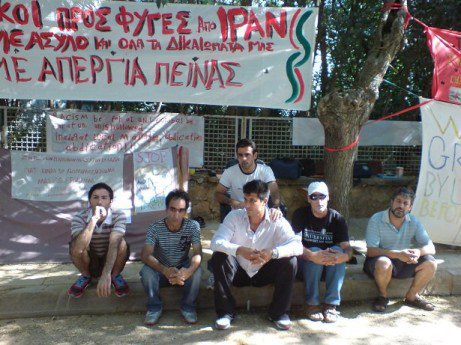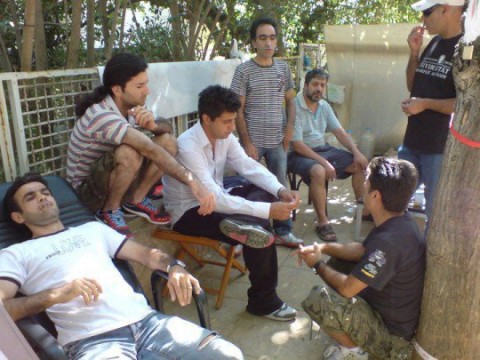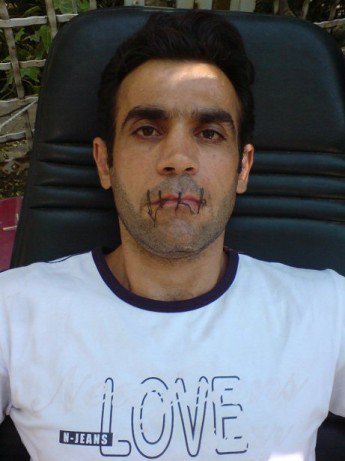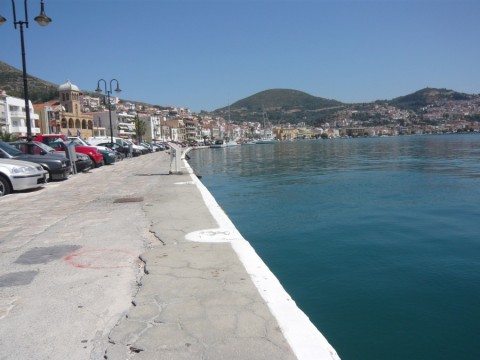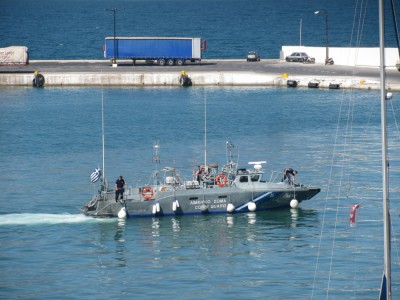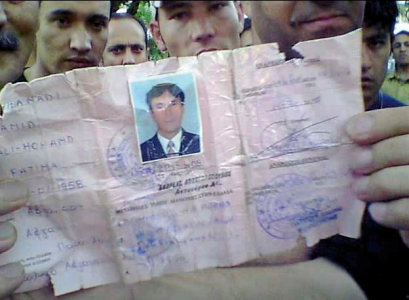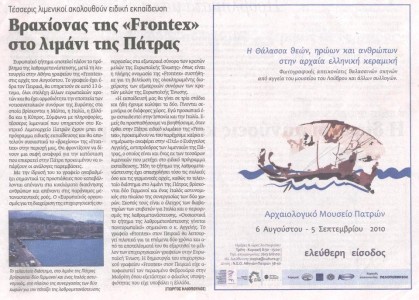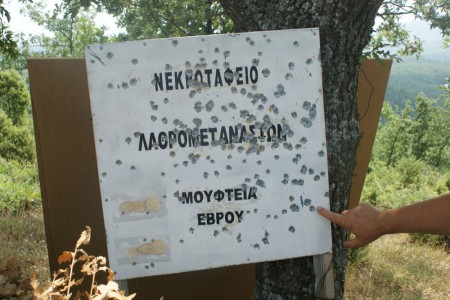The migrant prison of Pagani near Mitilini, Lesvos stood at the centre of the activities of last year’s noborder. During the noborder, the refugees imprisoned in Pagani started hunger strikes, while noborders stages actions outside, which together led to a significant number of people being set free immediately. September saw numerous revolts inside Pagani, cells were set on fire and the police ultimately withdrew. Pagani was declared as officially closed at the beginning of October.
Archive for the 'Content' Category
Page 6 of 13
Update 2: Victory!
Just found the information on the UNHCR website. We wrote:
We were discussing with a lawyer here in Greece, and she said that she would find it highly unlikely if they received political asylum, since the actual asylum system has been suspended. The Ministry of citizen protection itself has pointed out that it cannot brake the law by giving asylum based on a suspended presidential decree and said that only in September, when the new presidential decree would enter into force, asylum could be granted.
The UNHCR says:
Given the imminent threat to the health and lives of Iranian asylum seekers continued hunger strike in front of the Office of the High Commissioner of UNHCR, the Ministry of Civil Protection has decided yesterday to activate the Appeal Board for the accumulated applications provided by Presidential Decree 81/2009, “on humanitarian grounds and very exceptional, […] despite the government’s steadfast position that the current asylum procedure is impractical, ineffective and outdated.
So yes, our doubts were right, and yes, they did indeed get a proper asylum status. That is very good. Congratulations, we are so happy that all went well in the end! Why did our friends have to take such drastic measures in the first place?
#END OF UPDATE 2
Update 1: Victory?
Today, on the 30th of August, there was the announcement that the six of the seven hunger strikers will obtain political asylum, and that the seventh might likely receive it tomorrow. That would be a huge success. The hunger strikers have since been brought to the hospital, and we are very lucky that the hunger strike is concluded.
You notice the question mark in the headline? We were discussing with a lawyer here in Greece, and she said that she would find it highly unlikely if they received political asylum, since the actual asylum system has been suspended. The Ministry of citizen protection itself has pointed out that it cannot brake the law by giving asylum based on a suspended presidential decree and said that only in September, when the new presidential decree would enter into force, asylum could be granted.
So we were wondering if the hunger strikers were granted humanitarian protection rather than asylum? That would leave them in a much more difficult status, since it would not allow them to leave Greece as some hunger strikers have wished, and the access to social support in Greece would also be much more precarious. We really do hope that the hunger strikes did obtain a proper refugee recognition, and we will continue to look for more precise information. If you know something, please post it in the comments.
#END OF UPDATE 1
Since 13 days seven Iranians are on hunger strike in front of the UNHCR office in Athens. Two of them are in their 32nd day, and you can find previous reports here, here and here + video + video.
We went to see the hunger strikers, and this is our account:
One hunger striker, Seid Rouhollah (28) was deported from Germany back to Greece one and a half years ago under the Dublin II system. He came to Greece via Mytiline, Lesvos, in one small boat with 26 persons. He was the only survivor when the Greek coast guard punched a hole in their dinghy. Seid is a good swimmer, so he managed to survive, but since than he is afraid of the sea and in his nightmares he sees black bodies drowning in the sea and he can’t do anything – just save his own life.
Seid managed to leave Greece after three months. He arrives in Germany where he gets caught in the airport. He spends another three months in detention camp and is finally deported to “Grieschenland” (the word for Greece in a particular German accent). And “Tschüüüss” the german word for bye-bye he still remembers as the police said to him at the deportation. They also told him that it would be nice in Greece, because of the fine weather. He says: Maybe for vacation it is nice.
They say: Don’t worry, now they will care for you!
He arrives at Athens airport. They keep him imprisoned for 20 days. It is totally overcrowded, 20-30 persons in one cell. Only once a day there is food: ‘Malakas’ they say and they feed us like animals.
There is no shower and when he leaves he has scabies.
They issue him a Pink Card. Go, go!
they say and he has no shelter and no money. He contacts the Greek Refugee Council, but they say he shoud come again after one week. Since one and a half year now. There are not enough places in the shelters and since Seid is an adult man, he is not considered especially vulnerable. He has slept in a park since then. He says he had been waiting for the chance the hunger strike now gives to him, to finally make his voice heard.
Continue reading ‘On two of the hunger strikers in Athens [2 Updates]’
Today, Saturday, was the designated Frontex action day in Samos. We scored our first victory in the morning when all coast guard and Frontex ships withdrew from the port, disappearing somewhere. Up to now, they have not returned. The image below shows where they usually park their ships during the day… it is empty. We demilitarised, de-frontexisised Vathy, at least for a day.
In the last few days we gradually arrived in Samos and found a totally unexpected situation. The huge detention centre above Vathy is empty, all detainees have been transferred off the island, presumably to Athens, where they are either held in another detention facility or are released with the infamous White Paper.
Currently, there is an Italian Guardia Frontera ship in the harbour representing FRONTEX. The Dutch coast guard is present with a speedboat. From our observations, the latter basically go around and drink coffee at the various beaches. The Greek coast guard has two boats in Vathy, one of them is broken, though. The Italian Frontex ship leaves every night at 10 p.m. and returns in the early morning – but these days they are not very “successful”: According to what they say, they have not caught anybody during the last weeks. Inhabitants told us that still some people arrive on the island but without being caught. But compared to last year, arrivals have dropped dramatically. According to a chatty coast guard officer most refugees now choose the route via the Evros region in the north of Greece. The few people caught on the island are imprisoned in one of three police stations on the island and usually not taken to the detention centre, but sent to Athens straight.
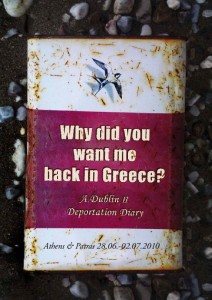
Why did you want me back in Greece?
, ask the refugees being returned due to the Dublin II regulation from different other European countries. The deportation diary carrying the same name evolved out of a short visit in Athens, where activists from the newly founded infomobile project conducted interviews with refugees affected by this European regulation.
The findings, based on interviews with the people affected, are shocking and deeply disturbing. For although every story of flight to and within Europe is different, if we were to summarise, there are two main conclusions that need to be drawn.
Well, well, nothing is ever moving as fast as said. A new article in The Economist brings the news that apparently, the opening of Frontex’ Branch Office in the port of Piraeus will be delayed until October, after it was supposed to first open in spring, then in August.
There are two more aspects in the article that are worth noting, summarised in this paragraph:
So Brussels is sending in the cavalry. Frontex, a Warsaw-based agency created in 2004 to manage the EU’s external borders, will open a pilot office in the Greek port of Piraeus in October. Earlier this month its executive director, Ilkka Laitinen, went to Athens to finalise the plan with Greece’s home-affairs minister, Michalis Chrisochoidis. There was much talk of “milestones” and “adding value”. But there were hints of frustration behind the smiles. Mr Chrisochoidis welcomed the symbolism of the move but says in practical terms it will be “a drop in the ocean”. As for Frontex, squeezed by budgetary and personnel constraints, Mr Laitinen politely describes its job as “a challenge”.
Well, the Economist might have it the wrong way, since it also credits to job of managing the EU’s external borders
to Frontex, which is not really true. However, the image of the cavalry
is interesting, as it might still be sufficiently describing the role of Frontex in Greece: They don’t come to support, they don’t come to coordinate, they come to get the job done, and that by any means necessary. We have already described what that means: Maximising border “security” by all means, minimising the respect for human rights and international law. Or is this again a misconception, citing the drop in the ocean
? We will be in Greece to find out.
Just to keep you updated on the activities of Frontex in the Aegean, we dug out this recent article from a local newspaper, reporting about Frontex in Patras. Is the advertisement next to it not great? Yes, the Mediterranean used to be an area of travel, exchange and commerce, why did we turn it into a mass grave?
Our friendly translator says:
4 coastguards of Patras Central Post Authority are following a special training program and will be the Frontex “branch” in Patras. They will report on the current situation for the implementation of the appropriate interventions.
[…]
Training consists of 3 levels and we completed two of them. Seminars are taking place in several countries. Me, for example, I have been trained in Spain and Italy. We will try to help the Frontex specialists group which will visit us, by providing crucial information, Evangelos Agelis, vice-president of Patras coastguards and one of the 4 coastguards in special training program, said.
[…]
In Patras port 2 german and 1 italian policemen are taking part in passport controls in order to reduce illegall migration.
This year, the Schengen Agreements turn 25 years, supposedly providing for passport-check-free travel in Schengenland. So how are those three border guards mentioned in the last paragraph controlling?
Answer to the vice Prefekt in Evros region Mr.Papaioanou.
On the 12.08.2010, we heard you on Thraki T.V , Mr.Papaioannou saying that this mass grave we have seen with our own eyes, doesn’t exist. You said: It was only some friends who buried their friends there and that the people who put this information on a blog are liars.
Since we, the ‘INFOMOBIL welcome to europe network’, are the ones who went to Evros region, in a group of 8 people from different european countries – among us journalists and fotojournalists – trying to find out if the afghan husband of a woman we know, who was lost in the river Evros on the 25 june 2010 (together with 2 other afghan men) to find out if he is alive…
We visited 16 places in Evros, mainly detention prisons but also hospitals, to try to find out.
During the first seven months of the year 2010, 38 human beings died while attempting to cross the heavily guarded Turkish-Greek border. The corpses of the dead are being transferred to the department of forensic medicine of the university clinic of Alexandroupoulis. Since they can often not be identified, only a DNA-test is being carried out so that relatives can still gain certainty.
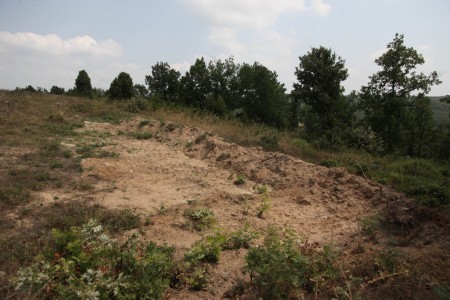
On 25th of June 2010 19 people drowned in the river Evros/Meriç. 14 corpses washed ashore on the Greek side and were brought to the university clinic by an undertaker from Orestiada. After the dead had been examined and registered, the undertaker brought them to a village of the Turkish minority on the mountains above Souflí for them to be buried on muslim cemetery.
Continue reading ‘Mass grave of refugees in Evros uncovered (1 Update)’
Summer is coming, we are again going to Greece, you might want to join us. In the meanwhile, we updated this blog and put more information and analysis into it. With this post, we will provide a short overview (Blogs are so messy…)
Swarming Noborder: From the 27th of August to the 11th of September 2010, the Network Welcome to Europe will once again travel to Greece. Join us, come along, be part of it, or simply follow our activities and findings in this blog. If you want to know more, read all details of the Swarming Noborder Greece 2010. And of course, you can follow all our activities on this site.
Screening Centres: Apart from establishing an asylum agency, the Greek state also plans to introduce so called screening centres in the quest to reform and modernize the system of migration control. In this analysis, we look into the proposal.
Frontex in the Aegean: The Europe of Schengen strikes back. If Greece cannot stop the migration flow, the European Union has a dedicated agency most happy to step in: Frontex, the European border agency. What are doing, what are they up to? Find out in our analysis.
Interviews: Milad, a friend of ours from last year’s noborder tells us how his situation is in Sweden, how Dublin II pushed people all over Europe and continues to do so, and what he thinks needs to happen. In another interview, we talk to M., a 17-year-old Palestinian youth that was framed by Frontex in Samos. They had taken a picture of the boat he was using to cross over from Turkey and boldly claimed that he was the driver and hence smuggler. A court saw this differently.
Pagani – Villa Azadi – Dikili: Many questions reached us concerning the state of Pagani and other things that are going on in Lesvos. We put together a short update. Another update gives a longer report about what is going on in Lesvos these days.
Samos: w2eu will take to Samos. Why? What is happening there? What is the significance of the new detention centre there, and what is Frontex doing on the island? Find out!
Discourse Space: Amnesty International released a report about the detention of migrants and refugees in Greece, and it sheds not good light on the state of affairs. The European Court of Human Rights condemned Greece for the detention and maltreatment of a Palestinian refugee, while Greece itself calls for a suspension of Dublin II.
w2eu.info: This is the other website of the network welcome to europe, providing information about the state of Dublin II, Asylum, Migration in the different countries of the European Union and beyond. It is meant as a direct resource for all border-crossers out there that need to know where to go best, and what to do there.

